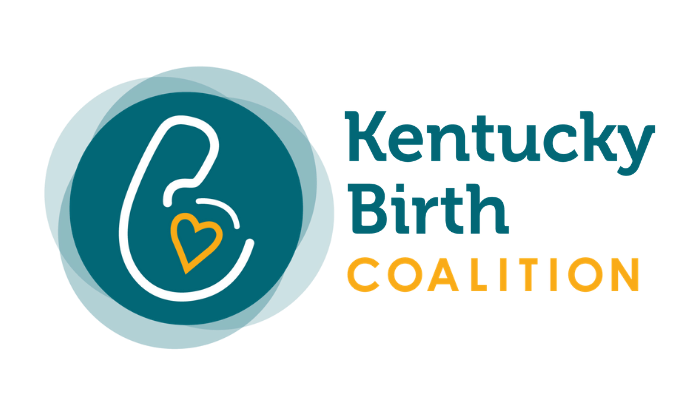FRANKFORT, Ky. — Legislation that will license and regulate certified professional midwives has advanced to the floor of the House of Representatives for final vote. Senate Bill 84 (SB84), sponsored by Sen. Tom Buford (R – Nicholasville) passed favorably from the House Committee for Licensing, Occupations & Administrative Regulations and received its second reading on the House Floor Wednesday, March 6. It previously cleared the Senate by a 32-4 vote on Feb. 21.
Several home birth families and midwives were present for the Wednesday morning committee hearing (pictured above).
If the bill is passed by the House and signed into law, Kentucky will become the 34th state to write into law a state license and establish regulations for certified professional midwives (CPMs) to be overseen by a diverse CPM Advisory Council under the Board of Nursing.
“Licensure for certified professional midwives is the missing piece to integrate them as partners in the existing maternity care system. We know from studies that integration of midwives improves many outcomes across the board. Without licensure, this integration is stifled along with efforts for quality improvement measures. In addition, licensure allows families to know that the midwife they are hiring has met certain educational and training criteria. Right now, it is hard to verify this. Families also currently have no way to report experiences with negligent providers,” says Mary Kathryn DeLodder of KHBC.
Nearly 700 babies are born at home in Kentucky per year, a rate of 1.2 percent, which is above the national average. Certified professional midwives specialize in “low tech, high touch” care and provide care only to healthy women experiencing low-risk pregnancies. This includes a full course of prenatal care through six weeks postpartum care. CPMs do not provide services for people who have health circumstances that should be managed in a hospital and do not replace a pediatrician.
The bill also provides added security and safety for families by licensing only midwives who have been nationally certified by the North American Registry of Midwives (NARM) and met the required education and training criteria.
The Kentucky Home Birth Coalition (KHBC) has pursued legislation to re-establish state license since 2012. Additional efforts were made prior to KHBC since the practice of midwifery in Kentucky became unregulated in 1975.
The current version of the bill has gained a neutral stance from previous opposition and support from various state and national organizations, including the Midwives Alliance of North America (MANA), which is the largest membership organization for midwives who practice community (home) birth in the United States since 1982.
“We ask that the Kentucky House of Representatives recognize the importance of midwifery care in the maternal and child public health system by supporting SB84. Midwives offer patient-centered care, which is culturally sensitive as well as affordable, and can be coordinated with other providers,” wrote MANA President Vicki Hedley in a statement.
What is a certified professional midwife and the midwifery model of care?
– Certified professional midwives (CPMs) are nationally credentialed midwives who provide primary maternity care. CPMs are the only maternity care provider specifically trained to attend births outside the hospital. CPMs are trained to provide health-promoting and preventative care that is evidence based and avoids unnecessary use of drugs and interventions. CPMs provide individualized, quality and cost effective care, are experts in the process of natural labor and the physiology of normal birth, are skilled in risk assessment to recognize circumstances that necessitate consultation with or transfer to other maternity care providers.
– Midwives have been able to receive the CPM credential since 1994, issued by the North American Registry of Midwives (NARM). The CPM credential received accreditation by the National Commission on
Certifying Agencies (NCCA). The NCCA accredits the credentialing organizations of over 150
healthcare professions including Podiatrists, Nurse-Practitioners, Certified Nurse-Midwives and
Nurse Anesthetists. Certification requirements can be found at narm.org.
– In the largest study ever conducted of planned home births, 89.1% of the 16,924 participants successfully and safely gave birth at home with a midwife. The study also reported a total rate of 5.2 percent of births that were transferred for a cesarean delivery. The U.S. hospital-based samples report a 32.8 percent cesarean rate. Of the 16,924 births reported in the study, 1,024 were vaginal births after cesarean (VBAC) with an 87 percent success rate. The most common reason for transfers to a hospital from a home birth is a failure to progress or fatigue.
– Births associated with CPMs through planned home births are associated with high rates of breastfeeding (86 percent of newborns exclusively breastfed at six weeks old) and good APGAR scores – only 1.5 percent of newborns had a low APGAR score (less than 7).
What does SB84 do?
– Establishes the CPM Advisory Council under the Board of Nursing, including midwives, physicians and Advanced Practice Registered Nurses (APRNs)
– Requires completion of birth certificate paperwork, newborn testing and annual reporting requirements consistent with requirements of other health care providers.
– Allows for open communication with healthcare practitioners, obstetricians and pediatricians and provide safety for midwives to openly identify themselves to caregivers to provide medical records should a transfer of care be needed.
– Allows CPMs to order medical tests necessary to confirm that home birth is a safe option, and establish a specific list of critical safety medications that CPMs may obtain and administer (but not prescribe), such as medication to manage sudden postpartum hemorrhage.
Sponsors of Senate Bill 84
Sponsor: Sen. Tom Buford (R – Nicholasville); Co-Sponsors: Sen. Julie Raque Adams (R – Louisville), Sen. David Givens (R – Greensburg), Sen. Mike Wilson (R – Bowling Green), Sen. Paul Hornback (R – Shelbyville), Sen. Denise Harper-Angel (D – Louisville), Sen. Reggie Thomas (D – Lexington), and Sen. Perry Clark (D – Louisville).

